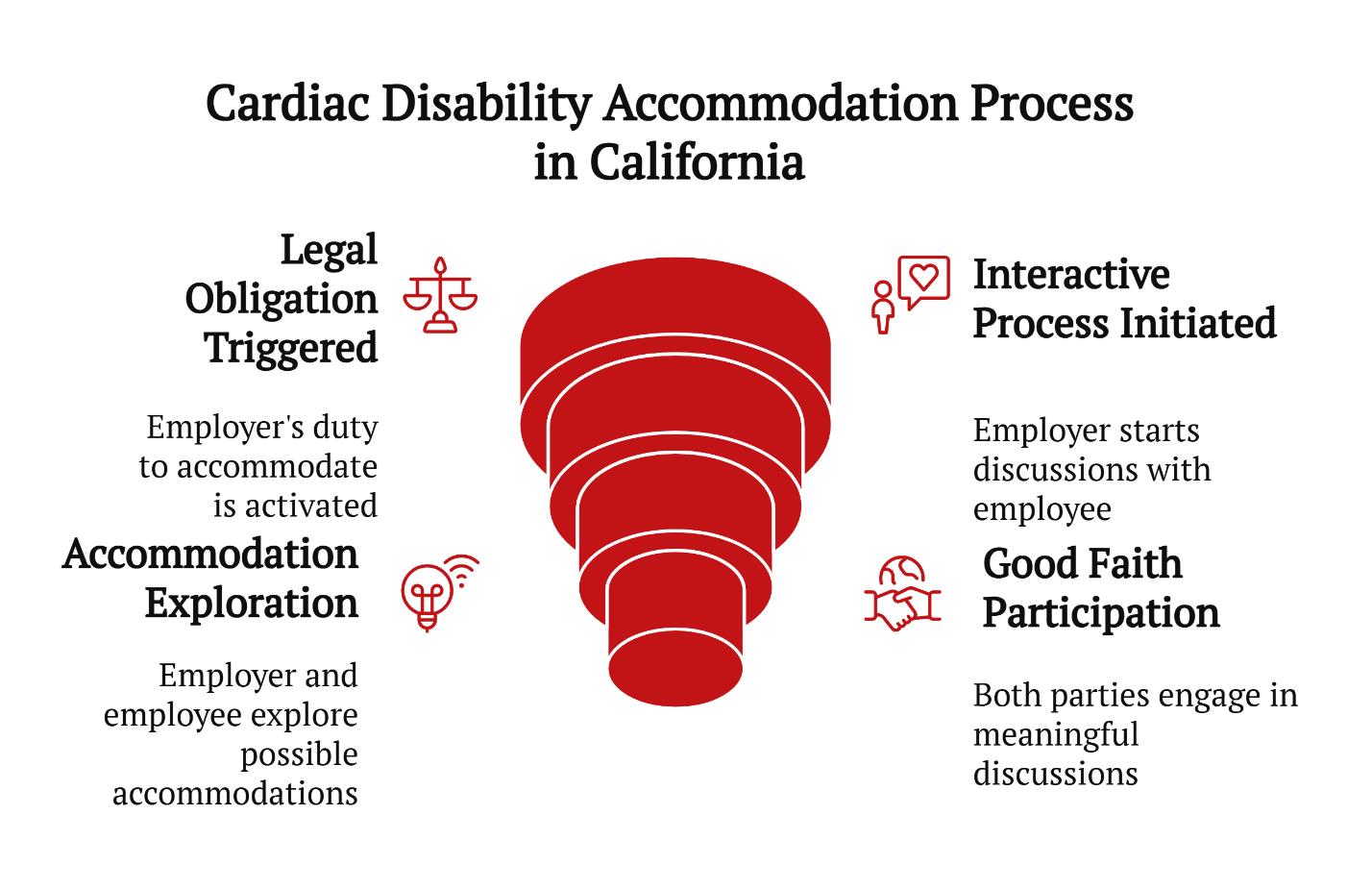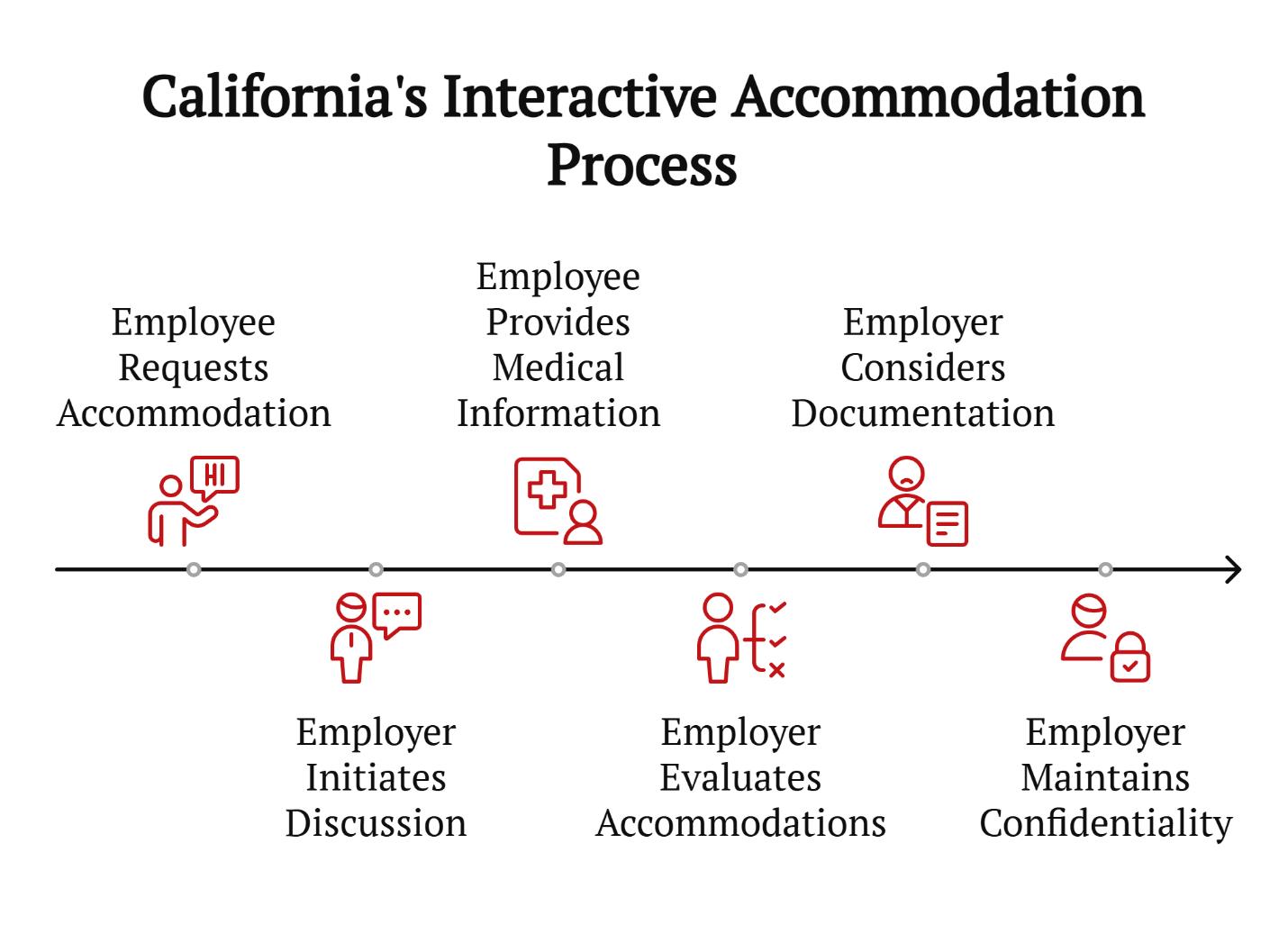📌 Key Takeaways
FEHA Protections for Cardiac Disabilities: California’s Fair Employment and Housing Act (FEHA) recognizes heart conditions, including recovery from heart attacks, as potentially qualifying disabilities that trigger accommodation duties by employers.
Employer Obligations Upon Medical Awareness: Employers must initiate a good faith interactive process when they know—or should reasonably know—about an employee’s cardiac-related limitations, even without a formal accommodation request.
Reasonable Accommodation Options: Common accommodations during heart attack recovery may include flexible work schedules, lighter physical duties, and low-stress environments. These must be tailored to individual needs and job functions.
Interactive Process Requirements: The interactive process is a legally required dialogue between employer and employee, supported by medical documentation and subject to confidentiality protections under California law.
Confidentiality and Retaliation Protections: Medical information disclosed during the accommodation process must remain confidential, and retaliation for seeking accommodations is prohibited under FEHA.
Understanding these core legal protections may help employees recovering from cardiac events evaluate their workplace rights more effectively. The full article explores these topics with legal precision and clarity.
Experiencing a heart attack can lead to significant personal and professional disruption. For many in Los Angeles navigating recovery, understanding workplace rights under California’s legal framework becomes a critical part of regaining stability. The California Fair Employment and Housing Act (FEHA) and, to a narrower extent, the federal Americans with Disabilities Act (ADA), provide legal pathways for individuals to seek accommodations during medical recovery. This content outlines essential legal concepts tied to cardiac-related workplace accommodations in California, especially for those facing employment challenges after a cardiac event.
California Legal Framework for Cardiac Disability Accommodations

California law recognizes heart conditions, including those resulting from myocardial infarction, as potentially qualifying disabilities under FEHA. Once an employer becomes aware—either formally or informally—of a heart-related medical condition that limits major life activities, they have a legal obligation to explore reasonable accommodations.
The state’s framework is notably broader than federal ADA provisions. Under FEHA, even temporary impairments may qualify, provided they substantially limit the individual’s ability to work or perform essential functions. Importantly, California law does not require a formal request before triggering the employer’s duty to initiate an interactive process. An employer’s knowledge of a recent cardiac incident may be sufficient to impose this obligation.
FEHA requires good faith participation by employees and employers in what is called a good faith “interactive process.” This entails timely and meaningful discussions aimed at identifying viable modifications to the work environment. Failure to initiate or complete this process in good faith may expose employers to liability under California’s disability discrimination statutes.
Common Reasonable Accommodations for Heart Attack Recovery
Disability accommodations are inherently individualized. No single approach suits every recovery experience. That said, legal standards do recognize a range of common workplace adjustments as potentially reasonable accommodations for individuals recovering from cardiac events:
- Modified work schedules, including part-time hours or flexible start/end times to support rehabilitation and medical appointments.
- Adjusted job responsibilities that reduce physical demands, such as reassigning strenuous tasks or limiting mandatory overtime.
- Environmental modifications, including ergonomic adjustments or access to less stressful workspaces to mitigate risk of further cardiac strain.
These examples are illustrative rather than exhaustive. Determining reasonableness depends on both the employee’s medical condition and the operational requirements of the position. A failure to genuinely consider potential accommodations for a disability, may be interpreted as non-compliance with the law.
Understanding the Interactive Process

At the heart of California’s accommodation framework lies the interactive process—a two-way engagement that both employees and employers are required to participate in. Normally this involves more than informal casual conversation. Normally the process envisions an ongoing dialogue that must be conducted in good faith by both employer and employee.
Key legal components of this process include:
- Employee responsibilities: Request an accommodation, engage constructively in the process, provide relevant medical certifications when requested, and communicate functional limitations clearly—without disclosing more than is necessary.
- Employer duties: Initiate discussions upon becoming aware of a potential disability, evaluate possible accommodations based on the employee’s role, and consider documentation provided by qualified healthcare professionals.
- Medical information protections: If the employee provides any medical information in furtherance of his or her request for an accommodation, California law requires employers to maintain confidentiality and protect the privacy of the employee.
Conclusion
Navigating the aftermath of a heart attack is challenging enough without the added strain of employment uncertainty. Fortunately, California law—particularly FEHA—establishes robust protections for employees facing health-related limitations. While reasonable accommodations are tailored to specific job functions, the legal duty to engage in a good faith interactive process provides a meaningful opportunity for workplace continuity during recovery.
Frequently Asked Questions (FAQ)
Q: What constitutes a reasonable accommodation for heart attack recovery under California law?
A: Under FEHA, a reasonable accommodation is a job-related adjustment that enables an individual with a cardiac disability to perform essential duties. This may include flexible schedules, lighter duties, or temporary leave. Each situation requires case-specific evaluation without imposing an undue burden on the employer.
Q: When should an employee consult an attorney regarding workplace accommodations for cardiac conditions?
A: Consultation may be warranted when an employer refuses to engage in the interactive process, denies an accommodation request without explanation, or terminates employment after a cardiac disclosure. FEHA prohibits such retaliatory actions and imposes proactive duties on employers.
Frequently Unasked Questions (FUQ)
Q: Do employers have obligations even if an accommodation is not formally requested?
A: Yes. Under FEHA, an employer’s duty to initiate the interactive process may arise from observable changes in job performance or awareness of a medical event like a heart attack—regardless of whether the employee explicitly requests help.
Disclaimer:
This content is for informational purposes only. This content is not legal advice. No attorney-client relationship is formed through this content. Please consult a qualified attorney in your jurisdiction for legal advice specific to your situation.
Protect Your Rights | The Akopyan Law Firm, A.P.C. | Top Gun Employment Lawyers
Have you been wrongfully terminated from your job? Have you suffered discrimination, harassment, or retaliation in the workplace? Has your employer violated wage and hour laws? If so, we can help. The Akopyan Law Firm, A.P.C. is dedicated to protecting and enforcing employees’ rights throughout Southern California. With a 97% success rate and millions recovered for our clients, our team of experienced and talented employment lawyers can fight to secure the justice you deserve.
Take the First Step Towards Securing Justice: Call us today to speak with one of our experienced employment lawyers. The firm offers case evaluations free of charge.
Contact Us Today:
- Phone: (818) 509-9975
- Office Locations: Los Angeles, Bakersfield, Costa Mesa, Temecula, Rancho Cucamonga, Oxnard, Culver City, and San Diego in California.
Important: Contacting the Akopyan Law Firm, A.P.C. does not create an attorney-client relationship, but all communications will remain private and confidential. Each case is unique. The Akopyan Law Firm, A.P.C., does not guarantee any outcome.

